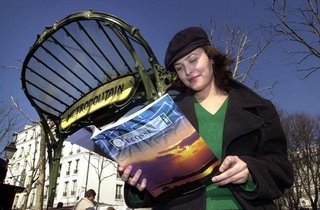Abbé Pierre: uncommonly great, uncommonly honest

You had your Queen Mother, we had Abbé Pierre.A remarkable priest and what he meant to France were summed up in those nine words. They came in response to my expression of mild surprise
that France 2 had devoted almost the whole of its lunchtime news to his death, aged 94.
Photograph: Abbé Pierre Foundation
There was a significant difference between the Queen Mother and Abbé Pierre. Whereas she was known universally, his was hardly a household name outside France.
At home, though, this friend to the poor, indefatigable battler for the under-privileged was a true saint in the minds of people who shared his concerns and liked his rebellious spirit, but could not hope to match his commitment.
That is why we were treated to reams of old footage with snapshot glimpses of a great man's life, reverential tributes from a succession of studio guests and clips of today's words of praise from everyone who matters or hopes to matter in France.
Chirac, of course; he is actually very impressive in such circumstances, and spoke of France losing "an immense figure, a conscience, and incarnation of good". Then Ségo, Sarko and the lesser presidential candidates.
As someone from France 2 put it, Abbé Pierre's appeal transcended real and supposed barriers; he was adored and admired by young and old, men and women, rich and poor, Left and Right.
In today's small hours, he knew he was dying, beaten by bronchitis, but had no fear of death, we discovered from one of the speakers. A niece, and an executive of the worldwide Emmaus charity network that he created, sat with him and prayed until he breathed his last at 5.25am.
By midday, they were talking of burying him among the greats at the Panthéon, of giving his name to the law on rights for the homeless about to go before the French parliament.
In fact, he had already expressed a clear desire to be laid to rest among colleagues from his 1954 campaign for the poor and unsheltered, during a ferociously cold winter. That will take his bones to Esteville in Normandy, where he lived for most of the 1990s at an Emmaus retirement home.
As for laws in his name, I doubt if he could have cared less. His foundation was not prepared to go beyond giving the legislation a oui mais, seeing it only as a useful start.
But the thing that struck me most about Abbé Pierre during the last two years of his life was that he remained one of his country's most popular citizens even though - perhaps because - he was big enough to own up to human weakness.
Towards the end of 2005, he admitted in a book that he had more than once broken his vow of chastity as a Roman Catholic priest.
Looking at the old television and newsreel film of a good-looking young man - if priests can be swashbuckling, he was - it was not hard to see that temptation would have crossed his path.
There had, he said, been "passing relations" with women, though he had not felt able to commit himself to anything more lasting: "I was very young when I dedicated my life to God and other people.
"I made my vow of chastity, but that did nothing to remove the strength of desire, to which I have succumbed in passing fashion......I could not allow sexual desire to take root. I therefore have known such desire, and on rare occasions satisfied it, but in reality this satisfaction has been a real source of dissatisfaction because I felt I was not being true.
"To be properly satisfying, sexual desire had to express itself in a loving, tender and trusting relationship. That was not open to me because of my chosen life."
I do not know how this went down in the Vatican.
But to their credit, it seems to have mattered not a jot to the French. Only a few months after making these comments, he was voted the third greatest Frenchman of all time, behind only de Gaulle and Pasteur.
Labels: Abbé Pierre, Charles de Gaulle, Emmaus, homeless, Jacques Chirac, Louis Pasteur, Nicolas Sarkozy, poor, president, Queen Mother, Ségolène Royal, Vatican, vows of chastity



